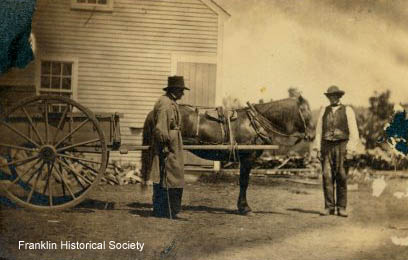|
FRESH STUFF DAILY |
|
|
||
|
|
||
|
|
||
|
SEE ALL SIGNED BOOKS by J. Dennis Robinson click here |
||
Page 2 of 3
Iffland is referring, of course, to the popular short story and play, "The Devil and Daniel Webster" by Stephen Vincent Benet. In this fictional tale, attorney Daniel Webster takes on the case of Jabez Stone, a New Hampshire farmer who has sold his soul to the devil. Webster defends Stone during a courtroom trial in Hell – and wins. Since the real Webster honed his legal skills during nearly a decade as a Portsmouth lawyer, the story has special resonance here on the Seacoast. Which is why Cabot, Iffland and others were recently in Portsmouth searching for "angels" to save the Franklin property and a cluster of historic buildings there that are presently unused and rapidly deteriorating. The group, with state architectural historian James Garvin, makes a compelling case for why the farm may actually be the sweetest spot in the world. They ticked off the reasons in a slide show fundraiser held recently in the home of New Hampshire senator Martha Fuller Clark in Portsmouth. It begins with that alluvial flood plain and almost a mile of frontage along the Merrimack River that creates some of the richest planting soil in, not only the state, but in the nation. Native Americans were drawn to this rich planting area, which makes it a prized location for future archeological research. The first white settlers began farming here around 1740 and the property is still being farmed today by a neighbor. Revolutionary War hero John Stark surveyed the road through the farm that has never been paved. There was a wilderness fort on the property during the French and Indian War. And that’s just the warm-up. Ebenezer Webster, Daniel’s father, arrived on the property soon after the Revolution around 1785. After Ebenezer’s death, the famous son transformed it into an experimental farm which was largely run by a hired manager. Webster visited when he could, relaxing from the furor of politics. Two extremely rare early photos show Webster on his bucolic estate just before his death in 1852. After the Civil War the farmhouse became a home for children orphaned by the deadly conflict.
According to Jim Garvin, the 1871 New Hampshire Home for Orphans, located on a working farm, was a step-up in the care of homeless children. It was "one of the first American orphanages to be located in a rural, healthful environment, away from the grime and congestion of the cities," Garvin says. In his slide presentation Garvin showed souvenir postcards of healthy farm children eating dinner, attending classes, working at the farm and playing with the animals. Charitable donations in the early 20th century led to the construction of a number of large brick buildings, a nursery, school and chapel. By the end of World War II the aging institution was renamed the Daniel Webster Home for Children. In 1960 the Sisters of the Holy Cross purchased the orphanage. Their numbers eventually faded, and in the year 2000 the Sisters sold the land and deteriorating buildings to a potential developer for $1.25 million. In 2005 the National Trust for Historic Preservation designated Elms Farm, as it is sometimes known, as one of the nation’s most endangered properties – a category previously applied to the Wentworth by the Sea Hotel on the Seacoast. The new Webster Farm protection group formed soon after with a complex use plan. Local farmer Dan Fife could farm and eventually buy the land, but not develop it. Recreational groups could manage public use for hiking, kayaking and hunting. Others might create an historic destination point, while another group could rent the campus of buildings. A separate volunteer group now watches over the Webster family cemetery that includes Daniel’s parents and siblings, as well as a few children from the orphanage, the former leader of the Sisters of the Holy Cross and residents of Franklin. It is an elaborate and optimistic scenario. But first things first, Julie Iffland reminds everyone and recites a three step process required before this unique parcel of land and historic features can be used effectively. "Those buildings are truly truly threatened," she says. "But first you have to control it, then you have to own it, before you can protect it." CONTINUE Webster Farm Please visit these SeacoastNH.com ad partners.
News about Portsmouth from Fosters.com |
| Friday, April 19, 2024 |


|
Copyright ® 1996-2020 SeacoastNH.com. All rights reserved. Privacy Statement
Site maintained by ad-cetera graphics

 HISTORY
HISTORY



















